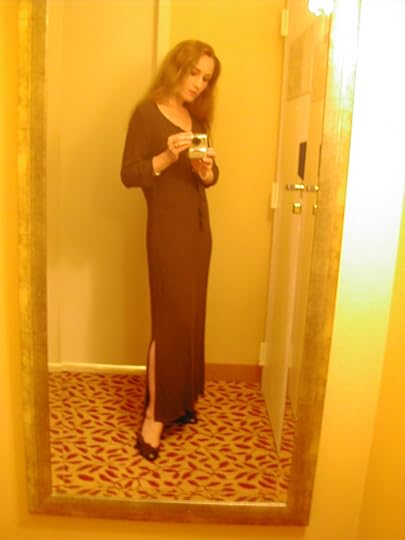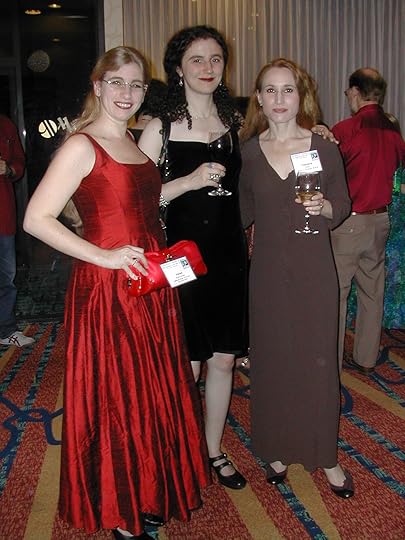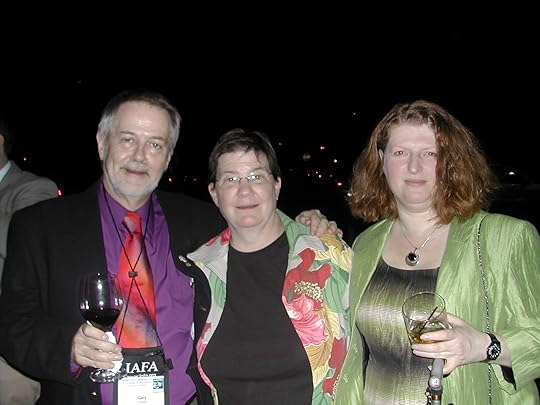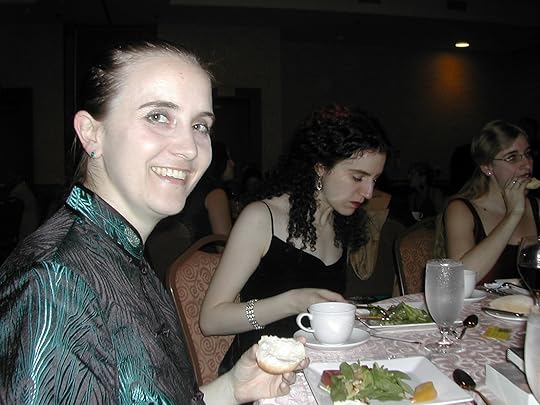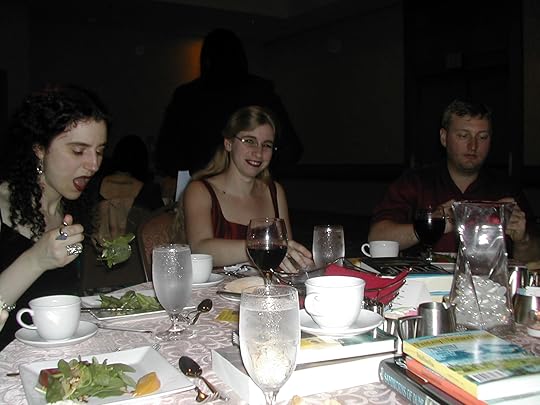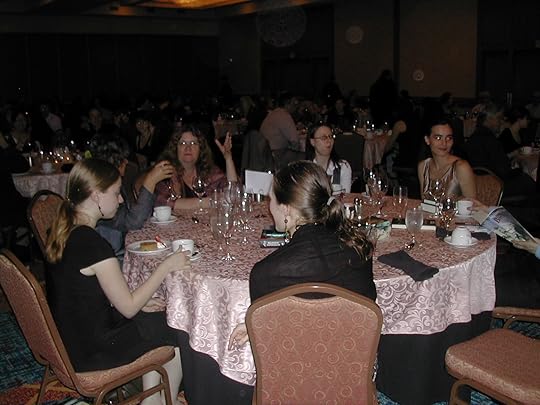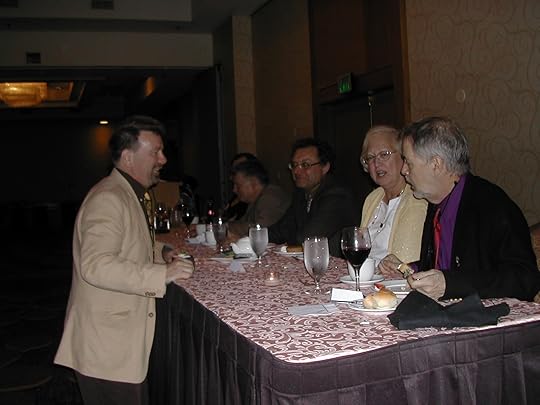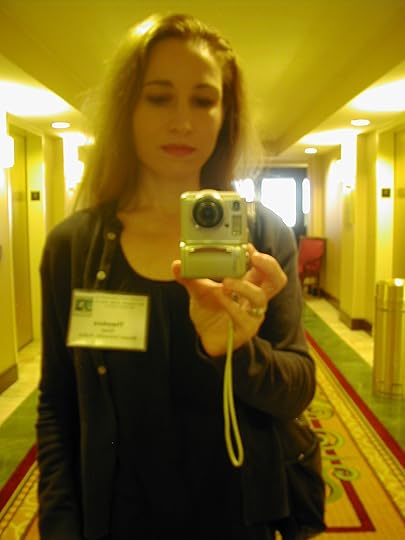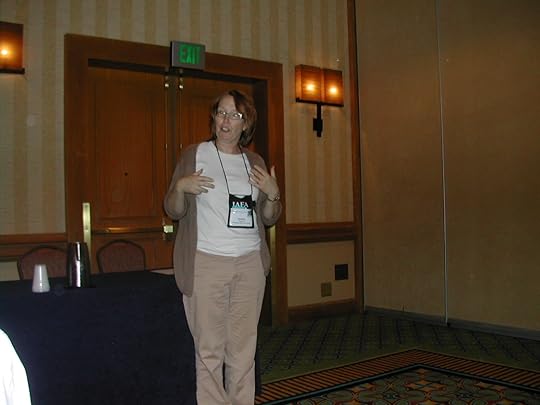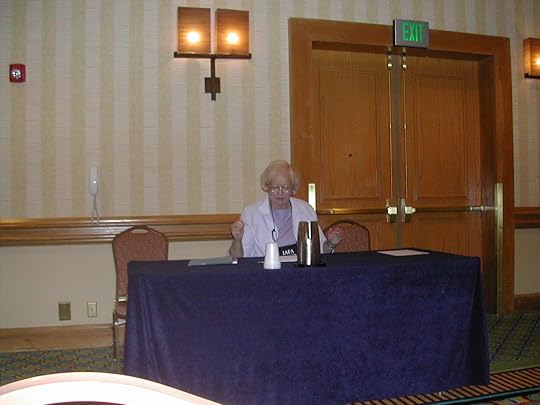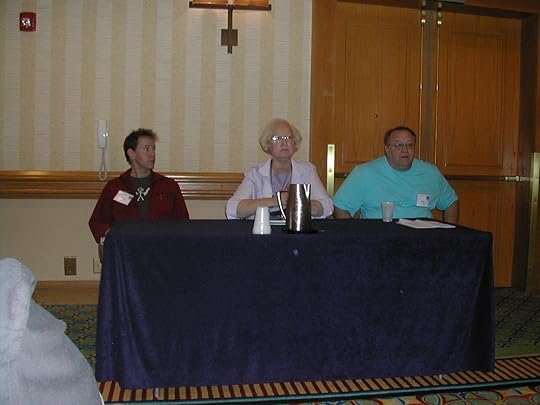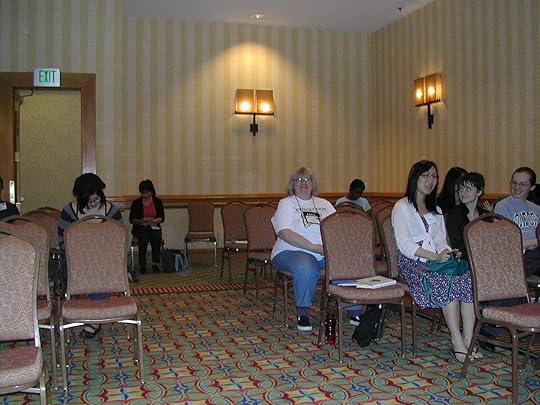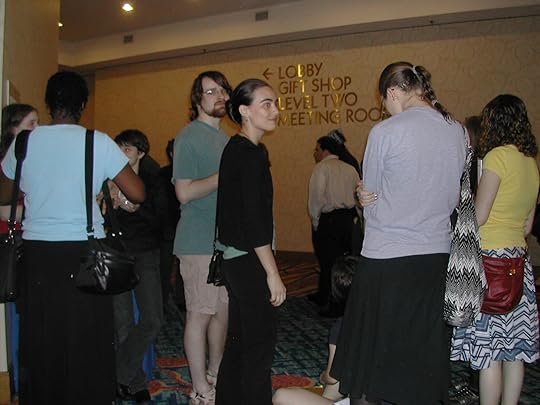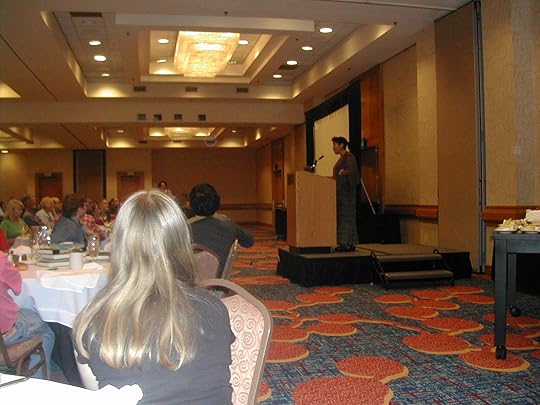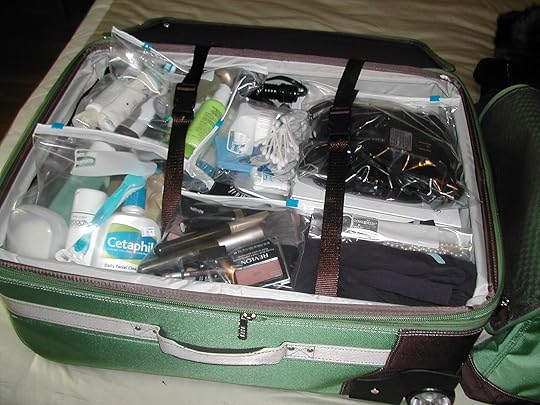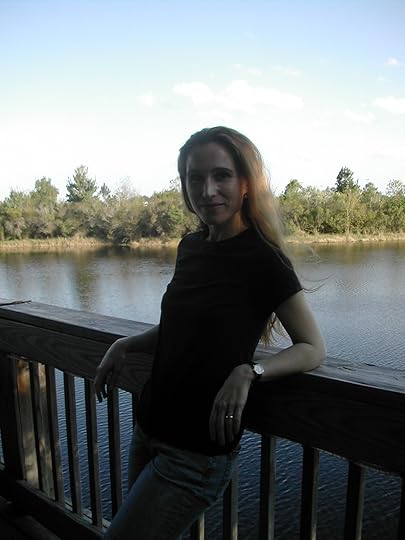Theodora Goss's Blog, page 64
March 22, 2011
A Sudden Trip
The train station says Shadowlands.
That's where I get off. I'm the only one. I'm wearing a gray wool coat that looks a little like a cape, and a shawl that Mrs. Moth knitted for me. A gray skirt and cardigan, black tights, and my black leather boots that tie up the front. They look almost like work boots. I'm carrying a basket that had my lunch in it, and still has a novel. I didn't read the novel. I just stared out the window as we came through the mountains. They look rather like the mountains in Switzerland. You don't realize how tall they are when you're among them. And then you come out into the valley, and there you are, at the small train station that says Shadowlands.
There's no one to meet me. I didn't tell them I was coming. (I didn't know myself until this morning.)
But here I am, and there's a long walk ahead of me. At least it's spring. Well, the beginning of spring, which means that it's actually cold, although I can see the green tips of crocuses pushing out of the ground. And buds on the forsythias by the train station.
I walk through the town, and it's getting late so the shops are starting to close. I walk into the baker's and buy a loaf of bread, hearty, filled with raisins. He gives it to me for half price, since it's the end of the day. I eat it as I walk along the road I know so well, although usually I'm in a car or riding a bicycle. Once I'm past the town, and it doesn't take long to get through it, it's all country. There are farms in the distance, and the road is lined with trees that hang over it, with gray and silver bark. I wish I knew what they were. I should have brought a book on trees, I think, rather than a murder mystery.
It's almost dark by the time I get there. I turn into the drive. The house is large, stone, just the way I remember. With a fountain out front, in the middle of the circular end of the drive. It's not working now, it's just a sort of stone pool. But I go say hello to the fish. Cordelia is sitting on the other side of the pool, and she stares at me for a minute, then finally says, "You're back."
"I decided to visit," I say.
"You didn't tell anyone," she says accusingly.
"No, I didn't," I say. "I just decided this morning."
She does not say anything else, just looks at me disdainfully. But that's what she usually does.
I walk up to the front door and knock.
It is a door that has always opened for me, although sometimes it will not open unless you know the secret word, or have brought an appropriate gift, or know magic. (I know magic. But don't tell, all right?)
And it opens, and Mrs. Moth say, "I'm in the middle of knitting you another scarf. I hope you like green, with brown bits in it. Have you had tea?"
And I say "Yes, very much, brown bits," and I sit in front of the fire and tea is brought for me, and Mrs. Moth and Miss Gray sit on either end of the sofa, the first knitting my scarf, the second embroidering something impossibly delicate, like white work on a linen handkerchief, and the first says "All right, out with it," and the second says, "Leave the girl alone, Nemesis."
And I say, "I just felt as though I needed to come, that's all."
And a few minutes later I say, "It's all impossible, isn't it?" and Miss Gray says "What is, dear?" and I say "Life," and Mrs. Moth says "Of course it is, if it weren't it wouldn't be life," and Miss Gray says "That makes no sense at all."
And I pull my feet up (yes, I have taken off my boots) and curl up in the armchair, and I finish my tea.
Later there will be a hot bath and a cotton nightgown which will be too long for me (I didn't even bring clothes, and Hyacinth is taller than I am), and I will curl up in the large four-poster in the tower room that always seems to be kept for me, no matter when I come. And I will read whatever I find, which will probably be some of the books I read as a schoolgirl, about other girls who are detectives or witches or both. And Mrs. Moth will look in and say, "It's impossible in many ways, you know. Impossibly beautiful as well. Impossibly difficult, which means we have to be impossibly brave. And sometimes impossibly kind to those it loves."
"Does life love me?" I ask her.
"It does, Thea," she tells me. "You are one of those whom life loves. And sometimes that makes what seems impossible possible for you. Now go to sleep. Tomorrow is going to be a sunny day, and Emily needs help in the garden."
I know what that means: pruning. But that's all right, I've always liked pruning, especially roses. Getting the garden ready for spring.
So I fall asleep, curled up in that large bed, among feather pillows, and dream of impossible adventures. Except that in my dreams, they are possible after all.








March 20, 2011
Why Go to Conventions?
I was asking myself the above question, coming back from ICFA. There are certainly plenty of reasons not to go to conventions. The main one is of course expense: I usually budget about $600 for a convention, with airfare, a hotel room, and food. That's a lot of money. And of course there's always an investment of time as well. I asked that question in particular after ICFA because usually I'm working much harder at conventions. At Boskone, for example, I was on six panels and did a reading. At ICFA I did a reading, that's all I was officially scheduled for. And then I also participated in a podcast for Locus. I spent a lot of time just sitting and talking to people. So what did I actually get out of the convention?
I'm going to list these as they come to me, so not in any particular order. But I met Peter Straub and was able to tell him how much I liked the issue of Conjunctions he had edited. I was also able to meet Rachel Swirsky for the first time. And I had a chance to sit down and talk with Jeff Ford, who is usually difficult to catch because he's so busy at conventions himself. So I was able to meet and talk with people I had not met before or don't see all that often. I had a chance to talk with Veronica Schanoes and Helen Pilinovsky, who are both wonderful scholars of the fantastic, and remind them that I was now editing Folkroots, so if they had ideas for columns, they should contact me. I talked to Brian Attebery about my dissertation. He reminded me about the Journal of the Fantastic in the Arts and encouraged me to submit a scholarly article. I had brought ten books for the book room, all of which sold by the second day, so I ended up signing those books and a bunch of other things I had written. I also delivered a contract and received a check. I've been told I can tell you about that project, so here it is:
It's an anthology called Kafkaesque: Stories After Kafka, and it's going to be edited by James Patrick Kelly and John Kessel, and published by Tachyon Books. It's going to include stories about Kafka or that show Kafka's influence in some way, and Jim and John are going to include my story "The Rapid Advance of Sorrow." I've seen the table of contents, and although I'm not sure whether I'm allowed to reveal that yet, it's going to be a wonderful book.
Based on my conversations with them about Kafkaesque, I came up with an anthology idea of my own and started discussing it with people in the anthology business. This one I won't talk about, because it's just an idea. But that's certainly one reason to go to conventions: ideas start bouncing around, and before you know it, you have an anthology project to work on.
There were other smaller things, like meeting Connie Willis for the first time (smaller only because I didn't actually get to talk to her, but certainly important), catching up with people like Andy Duncan, Paul Park, Ted Chiang, Gary Wolfe, Farah Mendelsohn, and generally getting a sense for what was going on in the writing world. And also, and this really is significant to me personally, meeting students in MFA programs and young writers in general who told me they read and liked my work. That means a lot, and it's one of the things that motivates me on days when I don't have as much motivation as I should.
So, I'm not sure I can do a cost-benefit analysis. The $600 was worth it to me, not because of the things I was scheduled to do, or even the unscheduled but relatively official things like the Locus podcast. It was worth it because of all the unscheduled, unofficial things. Because of the connections I made or renewed.
Why go to conventions? I would always argue for doing as much as you can at each convention. Take the panels, take the opportunities to moderate. But I think the only answer to the question I posed is: because you never know what will happen, what you will get out of it. You might get to meet someone, get a story idea, get a stronger or perhaps different sense of yourself as a writer. That's why I would go.
This morning I boarded a plane at 6:00 a.m., and although I did get some sleep after arriving in Lexington, I'm still very tired. And I've come back to a significant amount of work, waiting to be done. There's something magical about a convention, about being with so many people working on projects, discussing ideas. It's an intensely creative space, and while you're in it, you feel more alive. So there's always a feeling you get – or at least I get, when I come back. It's a sense of deflation, that I'm back to ordinary life now. It always makes me feel a little sad. So I just need to make sure that my ordinary life has that creativity, that magic, in it as well. Even if it doesn't have a lake, or a sign that says not to feed the alligators, or incredibly smart people sitting around and talking about their work.








March 19, 2011
The Banquet
I didn't take as many pictures as I wanted to, and the ones I took didn't turn out as well as I would have liked, because there was just so much to do. I was banqueting rather than being a photographer. And I didn't really get the dresses after all, because there just wasn't time.
But here are my final pictures from ICFA.
So first of all we have the dress, in all its – well, simplicity, because there really isn't much to it. I actually wore it to the Wiscon banquet last year, so I really should have given some other dress a turn. But at Wiscon, I didn't have the particular pair of shoes I wore tonight, and I did want to wear those. (As so often in life, it was all about the shoes.)
Here is the dress as it looked in the hotel room mirror. And, you know, here is me. Looking yellow.
And here are me and Veronica Schanoes and Helen Pilinovsky and Richard Butner. (Veronica's and Helen's dresses were amazing.)
First there was a reception, where I got a glass of wine and took pictures of Christopher Rowe, John Kessel, Barbara Gilly, Gary Wolfe, Ellen Klages, and Farah Mendelsohn.
Then we went into the banquet (you can see a general banquet picture on the left, below). I sat with some amazing people: Marie Brennan, Veronica, Helen, Helen's husband Jonas Oxgaard, Nisi Shawl, Karen Lord (who had won the Crawford), and Siobhan Carroll.
We were right next to the tables with most of the Dell Award finalists. Some were sitting with Sheila Williams, some with Ted Chiang.
I took pictures of some of the people on the podium: Farah, Andrea Hairston, Sydney Duncan, Terry Bisson, Paul Park, Connie Willis, and Gary, with James Patrick Kelly fomenting rebellion as usual.
Afterward, there were drinks by the pool. This vilanous lot is me with Jim and John. What evil plans were they coming up with, do you think?
I went up to my room fairly early, around midnight. And, as you can see, collapsed into a heap.
Tomorrow I fly back to Boston. I will miss ICFA, but next year the theme is the monstrous fantastic, and I will most definitely be back for that!








More from ICFA
When we left our heroine, she was feeling sick and going to bed. After a good night's sleep, she felt ready to return to her usual daytime activity (conquering the world). Well, almost ready. Her eyes still felt tired. But she knew there was a reading at 10:30 a.m. with Jeff Ford, Richard Butner, and Connie Willis, and she did not want to miss it.
Here is our heroine, feeling sick last night, and up and about this morning:
Why, oh why, do I post photographs of myself on this blog, when about half the time they show me in states of disrepair? With green goop on my face, or first thing in the morning before I've even showered? It's partly because when I read someone's blog, I like knowing what that person looks like. There is something disturbing about not seeing someone's face. It's as though you're not quite sure whom you're talking to. The other reason comes, believe it or not, from Oprah and her ilk, women who have their own magazines and are always on the covers. Now, I am not Oprah, nor was meant to be, but there's something important, I think, in making that gesture. It's easy to dismiss as self-aggrandizement, but I don't think that's what it is. Rather, it's a way of taking responsibility. It's a way of saying, this is my magazine, and I am responsible for its contents. And this is the way I look, on good days and on bad days. (Of course, I have a lot more bad days, and significantly fewer makeup artists, than Oprah.)
Having written that, I do not actually walk through conventions as though I'm posing for magazine covers, so here are some more realistic pictures of me from this morning. Sitting in Hotel Room Dora, and Going Downstairs to the Convention Dora. No, I don't know what happened to my eyes. Pollen?
Our intrepid heroine bought her yogurt and made her reading. Here are Sydney Duncan making introductions and Jeff Ford directly after his reading, sitting in the audience next to John Kessel:
And here are Richard Butner and Connie Willis reading:
And here are Richard, Connie, and Jeff answering questions. What an enthusiastic audience (Cecilia Holland, Barbara Gilly, Christopher Rowe, and Gwenda Bond)!
After the reading, we all went out to the pool for the Locus photograph, which will be in the next Locus, and then I went to meet Karen Burnham, Eileen Gunn, Paul Park, and Cecelia Holland. We went upstairs and participated in a Locus podcast, which should be available in about a week. (I'll link to it, of course.) By that point, I was starving about a quarter of the way to death (well, I don't want to exaggerate too much), so I bought a sandwich and went out to eat on the dock by the lake.
There, I met my lizard friend. Afterward, our heroine was particularly intrepid and went upstairs to put on her swimsuit, despite the fact that she does not remember the last time she exercised (but it's been weeks) and she feels as though she is in terrible shape. Nevertheless, she went to the pool (which you see here through the palm trees) and swam with the Dell/Alpha contingent. (To the male friend who asked if she was going to post a picture of herself in her swimsuit, she says, "You're joking, right?")
And that's it for now. The reason I'm posting early today is that later tonight there will be a banquet, and everyone will be dressed up, and I want to get pictures of all the dresses. And I'll be posting those separately. I figure, conventions and conferences need fashion photographers too. Officially, Locus fills that role. But why can't I be one of those fashion bloggers – for the science fiction and fantasy community? After all, not all of us dress like Princess Leia. (Yes, I mean the Jabba the Hut scene, and no, I'm not dressing like that. And yes, this comment is meant for the same male friend who asked about the swimsuit. Seriously, dude.) We're fashionable too, as you'll see later. In an individualistic and sometimes nerdy sort of way. (Nerdy being one of my highest compliments.)
That's all I have for now. Our heroine is tired and will probably lie down for a while. After all, she anticipates being up until – well, tomorrow, actually.
Signing off,








March 18, 2011
Worn Out
I did it. I wore myself out.
I've been rushing around so much in the last few days. Well, you know. You're on this journey with me. You saw me writing feverishly, finishing a project before I left for ICFA. You saw me pack, get on the plane, fly to Florida. Even when I was sitting by the lake, I was talking and talking, making connections with friends. Which is important, so important for me. But.
(I forgot to tell you, before I left Boston I was on my Blackberry because this year Wiscon had snuck up on me, and I realized that I not only did not have a reading arranged, but no room to sleep in. So I emailed friends, and by the time I landed in Orlando I had a reading, and by the time I got to the hotel I had a room. What would I do without you, beloved Blackberry? And beloved friends? Not in that order. But still, I am worn out.)
Today I woke up at 7 a.m. to get ready for a reading at 8:30. I decided to wear a skirt.
I took some pictures before the reading started. There were more people in the audience than you see here, but still, it was an 8:30 a.m. reading. This is what they look like. You probably remember who I was reading with: James Patrick Kelly and Rachel Swirsky.
But on the side of the room you don't see were John Kessel, Paul Park, and Andy Duncan. I would read just for those three, any day. What you do see above is the contingent of Dell Award winners and Alpha students, who are some of my favorite people.
After the reading, I sat and signed with Jim and Rachel. Bernie Goodman brought – well, probably everything I've ever published, for me to sign.
I took a couple more pictures, of the hallway and Jim signing.
Then, I went to the book room because the five books I had initially given them had sold almost immediately. So I gave them the last five. No books to take home!
Then I went to the Guest Scholar's Luncheon, where Andrea Hairston gave an absolutely wonderful talk about – well, it covered so many things, but it was about District Nine and African cultures and colonialism. I hope it's published soon, because I know it's the sort of article that will interest people both in the academic and writer communities. Among other things, Andrea praised the work of Nnedi Okorafor, who was one of my Clarion classmates and has become a wonderful, and truly significant, writer of science fiction and fantasy that often touches on issues of race and culture. I'm very proud to have been at Clarion with her! I sat at a table with the Dell/Alpha contingent. Have I mentioned that they are some of my favorite people? And some of them are my former students!
Their success is the best advertisement for the Alpha Science Fiction, Fantasy, and Horror Workshop for Young Writers.
But by that point I was starting to feel tired and ill. No matter what I did, I couldn't seem to get warm. So I went up to my room, changed into my pajama pants, and crawled into bed. And I slept.
I'm still not feeling well, but at least I'm up, and later I think I'll try to get some dinner. This happens, when I drive myself too hard. And I have been driving myself hard lately. I feel almost as though I can't lose a moment.
While reading Hecate's blog post "Synchronicity: Wherever You Go, There It Is," I came across some lines from Mary Oliver's poem "The Summer Day":
"Tell me, what is it you plan to do
with your one wild and precious life?"
I think I've been trying to answer that question by doing and doing. And honestly, that's my best answer right now. But at some points I think I have to rest too, or I'll end up as I am, sitting in front of this computer in a t-shirt, sweater (because so cold, although I've set the thermostat at 80), and pajama pants, with messy hair. Thinking I'll have to get dressed at some point, go down and get dinner for myself. But I think I'll spend the rest of the evening up here, just by myself, in the silence. Maybe reading. After all, I need that too.








March 17, 2011
Going to ICFA
Honestly, I'm almost too tired to write. I'm typing in my hotel room in Orlando, Florida. I'm at the International Conference on the Fantastic in the Arts. It's not all that late, for me. But last night I only slept for about three hours, and I traveled for most of the day, and then immediately went into convention mode and started socializing. So really, I should probably just go to sleep.
But I'm going to post a few pictures first.
As I mentioned, I spent most of last night packing and making sure that I had done everything I needed to at home. Here are my suitcase and overnight bag. I know, they're far too large for a trip like this one, which is only going to last four days. Ordinarily, I would pack a smaller suitcase for a trip like this, but I had to bring ten copies of my short story collection. You can see them, just a bit, in the right side of the suitcase, under whatever it is I have on top of them. In my overnight bag, I brought The Secret History of Fantasy, which I may get to read at some point during the trip. I've been stuck halfway through "Mythago Wood," by Robert Holdstock, for a while now. Yes, I put all sorts of things in clear plastic bags, including my shoes.
In the picture above, the overnight bag is only half full. It has my travel blanket (which I use to keep myself warm on airplanes, and wrap around myself on various occasions when I get chilly), my writing notebook (I don't go anywhere without one), and the netbook I'm typing on at the moment. Still to come are necessities like a bottle of water and a magazine (bought at the airport), and snacks. You can see the snacks below. In the Orlando airport, I saw a sign: Many bags look alike! Make sure you take your own. I don't think I'd have problems with that, do you? Mine are pretty distinctive, green with my initials on them. Yes, it's silly to have your initials on your luggage. Until someone else has the exact same luggage as you do.
Here, I have arrived at the hotel and changed into short sleeves for Orlando. Although of course I brought a sweater for the hotel. One thing you learn after going to conventions for a while is that you will always need a sweater, because the hotel will be cold from air conditioning no matter what the temperature will be like outside. (Actually, I brought three sweaters. Four pairs of jeans, three skirts, four long-sleeved shirts, four short-sleeved shirts, three sweaters. For four days. I always seem to overpack. And one banquet dress, but more on that later.) While taking this picture, I realized how desperately I need a haircut. See? It's almost down to my waist, which means almost unmanageable. (Sorry about the yellow light. Hotels always have terrible lighting.)
When I went down to the lobby, I immediately started seeing people I knew. First, I ran into James Patrick Kelly, John Kessel, and Connie Willis sitting at a table. (I think there were a couple of other people there whose names I don't remember, so apologies to those folks). Brett Cox came and joined us for a while as well. I had to bring my books to the book room, which I did next, giving them to David Hartwell and Joe Berlant. Then I ran into Veronica Schanoes, Helen Pilinovsky, David Attebery, and Bernie Goodman. We sat and talked for a while. And then Veronica, Helen, and I went out to the area by the pool, which is also by the lake. Here we are with Jay Lake and Mari Ness.
Here is the lake, and Veronica and Helen sitting at the end of the pier. There is a sign that says Fine for feeding alligators: $5000. We discussed the fact that feeding an alligator was likely to be its own punishment, no fine necessary. We saw a number of different birds. It was peaceful and lovely, and the only thing missing was that the poolside bar was closed. What was the hotel thinking?
This is me, by the lake. Not feeding alligators.
Toward the end of the day, I did actually go to a convention event: a panel on the ridiculous in science fiction and fantasy with Andy Duncan, Andrea Hairston, Connie Willis, and Terri Bisson. They are all incredibly smart and funny folks, and Andy had brought a mechanical raccoon that played the harmonica. Which was, well, ridiculous.
I'm afraid that's all I have for you today. I'm going to sleep. Tomorrow morning I have a reading at 8:30 a.m. with Jim Kelly and Rachel Swirsky, who edited the wonderful People of the Book: A Decade of Jewish Science Fiction and Fantasy, in which she included "The Wings of Meister Wilhelm." I'm reading part of "Pug," which comes out in Asimov's Fantasy Magazine this summer.
Wish you could be there!








March 16, 2011
Poet or Novelist?
I was thinking today about who I am as a writer, about all the things I do: write articles like "The Femme Fatale at the Fin-de-Siècle," stories like "The Mad Scientist's Daughter," poems like "Ravens." And if all goes according to plan, this summer I will start writing my first novel.
Am I a poet or a novelist? Because these things seem to me so different: a poem is different from a short story is different from an article. And a novel seems its own sort of beast, different from any of those three.
I actually started writing poetry first. I thought I was going to be a poet, and read and wrote a great deal of poetry in high school. I took poetry classes at the University of Virginia, which I'm afraid destroyed any desire I had to be a poet. The poetry we read and wrote seemed so terribly bland. We weren't exactly in the land of Keats' nightingale. There was no sense that we were doing anything magical, and for me poetry had always been magic. It had always taken me away, even more effectively than prose, to a world that was not this one, where language itself became a spell. (I've had an idea, for a while now, of a story in which the poets are also the magicians, as they were in Irish legend. I would still like to write that story.)
It was the language I loved, in poetry. And the closer that language came to prose, the less I was interested in it. I wanted this:
Away! away! for I will fly to thee,
Not charioted by Bacchus and his pards,
But on the viewless wings of Poesy,
Though the dull brain perplexes and retards:
Already with thee! tender is the night,
And haply the Queen-Moon is on her throne,
Cluster'd around by all her starry Fays
But here there is no light,
Save what from heaven is with the breezes blown
Through verdurous glooms and winding mossy ways.
That's what I wanted, to fly away on the wings of Poesy, to find those "magic casements, opening on the foam / Of perilous seas, in faery lands forlorn." I wanted to see – to travel to – the faery lands forlorn. And the modern poetry we were reading and writing did not take me there.
So I started writing stories instead. There is a sense in which poetry is about language, no matter what else it is about. Stories are about language too, many of them – but to a different and lesser degree. There are so many other things for them to be about. They are less wrapped in themselves, more opening out to the world. And I suspect that is even more true for a novel. A novel is about the world, about reflecting and perhaps even altering that world, whereas the poem is, in a sense, its own world – a small asteroid of words.
So what am I as a writer? I don't write much poetry nowadays, for the rather mercenary reason that it can take me an entire day to write a poem, rewriting and rewriting the same lines. In that time, I can write two thousand words of a story. And someone may eventually pay me $500 for that story, whereas I will be lucky to earn $5 for that poem.
And yet, having written all this, I have to admit that I still think of myself as a poet – at heart, or perhaps at root, however I should express the center of who I am. Because at the center of who I am as a writer, there is a turning toward language, to the magic of language, which matters to me more than any other element of a story. It is still what transports me, what takes me to those faery lands forlorn.
Sometimes I am not a particularly good poet, but I will still include a poem of mine here, written last fall, right around the time I wrote "Ravens." Nowadays, poetry is what I write when I can't seem to write anything else, when poetry is all that will come out. This is how it came out, one day.
Raven Poem
On the fence sat three ravens.
The first was the raven of night,
whose wings spread over the evening.
On his wings were stars, and in his beak
he carried the crescent moon.
The second was the raven of death,
who eats human hearts. He regarded me
sideways, as birds do. Shoo, I said.
Fly away, old scavenger. I'm not ready
to go with you. Not yet.
The third was my beloved,
who had taken the form of a raven.
Come to me, I said,
when darkness falls, although
I'm afraid you too
will eat my heart.
Not Keats, exactly. But it's what I do, at the core of what I do. Even, I suspect, when I'm writing an article, a story – or a novel.








March 15, 2011
Making Time
I was talking to a friend who is also a writer, and he asked whether the social networking I did (blogging, posting on facebook, tweeting) took part of my writing time. And I started thinking about how I've arranged my life to make time for writing. Because I think the answer is no, it doesn't take part of my writing time – I just have to make extra time for it. But time – whether for writing, social networking, or going to conventions, is always an important consideration for a writer.
And my time is particularly precious right now, because I'm not only writing but also teaching full-time and attempting to finish a doctoral dissertation. And I have a seven-year-old.
To be honest, I think what I did to make time for all those things is cut out the things that wasted time, that didn't seem worthwhile. But that took looking at life a little differently.
So for example, once upon a time I used to make dinner. I would get home from the university and make dinner, which took about an hour. When we lived in the city, that was easy to do and still left time in the evenings. But here, after my commute, I am far too tired in the evenings. So instead of making dinner, I rely on organic frozen dinners. I know, they're not homemade, but they're as healthy as anything I would make myself, and Ophelia gets to try all sorts of things I don't know how to make. She likes Indian food in particular. Also, I could never get her to eat vegetables, but when they're in one of these dishes, she eats them without thinking about it. It's healthy and easy – I just had to learn to deal with the assumption that it was always better for me to cook. I'm sure I'll go back to cooking myself at some point, but right now, these are the perfect solution. And while they're cooking in the oven, I can write a blog post.
There are all sorts of other ways in which I decided to simplify my life and make time for what I thought truly mattered. For example, I decided a long time ago never to buy any clothes that required dry-cleaning. Clothes that need to be cleaned that way are fake clothes, anyway. Clothes made of synthetic fabrics. Anything natural can be washed. And I never bother anymore with anything that needs ironing. All of the dishes and utensils go into the dishwasher, including the silver plate. If silver plate is used every day, it doesn't need polishing. I have furniture that doesn't need a lot of care, solid wood pieces. The floor requires sweeping and the rugs must be vacuumed, but this is a small house, relatively easy to keep clean. (It could be both cleaner and neater, but here I've decided that I'm not going to feel guilty about spending time writing instead of cleaning. Because after all, everyone who visits tells me how neat my house is. So that's good enough, right?)
We have two cats, who generally take care of themselves. The seven-year-old is surprisingly self-sufficient, although she would get you to play endless games of Ninjago if she could. (And she would win.) She goes to an after-school program that she loves, and when she gets home she does homework, or reads, or watches videos. (She can download Netfix instant, which is more than I know how to do.) I think there are things I've done with her, too, that have made childraising easier. If she doesn't want to eat something, she doesn't have to. After bedtime, she has to be in her room, but can stay up and play if she'd like. (She's very good at putting herself to bed.) I never take her shopping unless it's for her, because I remember from my own childhood how boring that can be. We've always treated her as a person with her own point of view, her own choices to make, and I think that's given her the ability to make choices effectively.
I should say, too, that there are a lot of things people consider leisure activities that I don't bother with, partly because to me they're not all that interesting. Going to movies in theaters, for example. Any sport that involves a ball. (I've discussed, haven't I, my experience with balls? We repel each other, like magnets. Imagine how difficult that made kickball, in elementary school!) Going sailing, just to go sailing rather than getting anywhere. Going to any sort of gym for exercise. (Why? I'd rather go to a dance class.) Going to a spa. (Why? I'd rather learn to spin wool, or fight with a sword, or just about anything.) And I don't shop, except when I'm going to an old book store, a thrift store, an antiques market. If I'm going to shop, it's going to be an adventure. (Malls. Why?) That's a good rule, actually: don't do anything unless it's an adventure. The other stuff: what's the point? (Unless you like doing it, of course, and then you should. But don't do things just because you feel as though you ought to.)
Not that it's effortless. There are days when I'm tired, days when I don't want to write. But I do think that writing is not about having time, but about making time. It's about priorities. It's about doing the things that truly matter, and trying to minimize the rest.
Now, I'm going to watch about an hour of television while eating Cherry Amaretto Coconut Milk ice cream, which is what I call multitasking. And then I'm going to write.








March 14, 2011
The Other Stuff
When I started writing seriously, just before I went to the Odyssey Writing Workshop (where, incidentally, I'm going to be teaching this summer), I imagined that my writing life would go something like this: I would write. What I wrote would be published.
But you know, there's a whole lot of other stuff you have to do as a writer.
I'm not talking here about what everyone's discussing nowadays, building your author platform (an imprecise metaphor, I think), publicizing your work, all that. I'm talking about stuff.
Let me tell you what I was doing today. First, I was revising a manuscript. I should say making final revisions to a manuscript, because that's actually quite different from revising. When I'm revising, I'm still changing significant portions of the story, still making decision about how the story is going to go. By the time I'm working on the final revisions, I'm deleting commas. (I have the bad habit of using too many commas in my writing, particularly before conjunctions that don't separate independent clauses. As I tell my students, commas aren't pepper. You can't just sprinkle them into your writing. I don't quite do that: I do teach grammar after all, and I know the comma rules. But I usually have to go back and take some out. And I can agonize about commas. For hours.)
Once I had made my final revisions, I sent the manuscript to the editor. And then, I focused on stuff. First, I went over a contract. When I'm going over contracts, I'm actually grateful that I was a corporate lawyer, because at least I know what the various parts of the contract are for. How do people who aren't lawyers do it? A publishing contract can be confusing, and you may not have an agent to explain it to you. The contract may be too small to make getting an agent worthwhile. So it's a good idea for writers to understand the various contract provisions and what is standard. I suspect that most writers don't. But there are two instances in which you absolutely need to think of your writing as a business: when you're signing contracts and when you're handling taxes.
Then I proofed a story that will be coming out later this year. You always have to proof stories because although editors and copyeditors are wonderful, and I would certainly not want to live without them, there are times when they don't know specific usages that you've incorporated – in my first published story, for instance, a copyeditor suggested that a backboard (which is tied to a Victorian girl's back to keep it straight) should be a blackboard (awkward to tie to a girl's back, at the best of times). Proofing takes time, but it's absolutely crucial, and it's one of the things that writers usually have to do quickly because of publishing deadlines.
Then I sent an editor my biographical information. It's a good idea to have a paragraph of biographical information written and readily available, and if you're going to be asked for biographical information often, you might want to have several paragraphs of various lengths. And you need to keep them updated. (Also have a current author photo. That's another thing you're going to be asked for often.)
And then there were emails: requests for interviews, requests to reprint stories, that sort of thing. Each of them needing to be answered, and a pleasure to answer because who doesn't want to have those sorts of opportunities? But again, stuff that isn't writing.
One of those emails told me something I'm completely thrilled about:
My story "The Mad Scientist's Daughter" was the first place story in the Strange Horizons Reader's Poll!
Evidently I get a certificate, which I'm going to hang on my wall because for me, that's what writing is all about: communicating with readers. And if the readers liked my story, that's what matters to me, more than awards or right up there with money. (Don't get me wrong, awards are awesome too. And I cannot exaggerate the awesomeness of money. Although I have to admit that I would write even without the awards and money. But don't take this as a reason not to pay me . . .)
I guess the message of this particular post is that if you're writing regularly, you have to start thinking of your writing as a business – probably earlier than you thought. Even if you're only publishing a couple of stories a year, you're going to have to deal with the other stuff. But you know, that's good. That means you're having a vital, exciting writing career. And that's what most of us want, I think.








March 13, 2011
Becoming Yourself
You'd think that being yourself would be the easiest thing in the world, wouldn't you?
But I think we lose ourselves somewhere along the way. I suspect it starts in sixth grade, meaning middle school, which is a sort of state-sponsored engine for the crushing of souls. In sixth grade we learn, if we haven't learned it already, that we're supposed to be a number of things we probably aren't naturally, such as cool. Sixth grade was when I first started to realize that there were fashionable clothes, and that I didn't have them.
And then there's high school, where the message becomes more complex and sophisticated. In my high school, there was tracking, which meant that certain kids were on the academic track and certain kids weren't. (I was on the honors track, which was a separate system, about fifteen of us taking classes all together, essentially separated from the rest of the school. Imagine how cool that made us! If you did not notice the sarcasm in that last sentence, you must have gone to school in another country.)
What were the expectations placed on me? I was supposed to be pretty and have boyfriends. That was what my peers expected. I was supposed to excel academically, that was what the school expected. I was supposed to go to a good college so I could eventually have a successful, meaning reasonably lucrative, career. That was what my family expected.
I had a vague idea though all this that I wanted to be a writer, that writing was somehow at my core. But I was also the captain of the debate team, because I was probably going to law school, and the Cheshire Cat in Alice in Wonderland because my boyfriend was in drama, and on the tennis team I have no idea why, because I'm naturally the sort of person who cannot hit balls.
And then I went to college at the University of Virginia, and I was supposed to be pretty and have boyfriends and excel academically and go to law school, but by then I think I had developed a subversive streak. I worked as an artist's model, I dated the boys who had to leave next semester, I stopped telling my family which classes I was taking because they were simply not going to understand how African and Caribbean Literature was going to advance my career.
But I still went to Harvard Law School. And that was it for me. I think at one point, on the forty-second floor of the MetLife building in Manhattan, I looked at myself in the bathroom mirror and asked the Caterpillar's question: who are you?
It's very difficult, after you've spent twenty years and eighty thousand dollars becoming someone else, to become yourself again. It takes time. At that point you can't just be yourself anymore, because you have no idea who you are. You have to figure it out.
I'm sure there's a better and easier way than the way I tried, the way that more or less worked for me, over time. I first read about it in Oprah Magazine, make of that what you will. The way has two steps:
First, ask yourself what you like.
Second, try to go in that direction.
So for example, if you're standing in front of a display case full of cakes, as I was yesterday at Berdick's, look at all the cakes carefully and ask yourself, what do I actually like? Do not order the richest, most chocolaty thing because that's what you're supposed to order in a chocolate shop. Do not order whatever looks least caloric because you're supposed to be losing weight. Try to figure out what you actually want. And then get it, unless you're simply not sure. In that case, order something as an experiment, and see if you like it. Treat your journey through the world on any particular day as an experiment in what you like.
There are a number of things I thought I liked that I realized I didn't like after all. Dramatic, sweeping skirts. They were gorgeous, and I kept stepping on them. Waist-length hair. I had it for years, and it didn't actually suit me. (I grew up with short hair, which was my mother's idea, and that didn't suit me either. So I've been to both extremes.) I've been through three different pianos because I thought I really ought to have a piano, and they were free. (There are a lot of free upright pianos out there.) Each time, they took up space and were never played. And don't get me started on when I adopted two borzois because I had a secret thought that I might be a Russian countess under the skin. (I am not. I like pets that walk themselves and have no deep-seated desire to slay wolves on the steppes.) And no matter how beautiful I think hats are, I will never, ever wear them because I find them hot and itchy. And they're always blowing off in the wind.
In other words, I've made some strange mistakes.
The surest way to become yourself again, I think, is to discover what you actually like, item by item, and fearlessly acknowledge it, not matter how uncool it makes you. I have a passion for murder mysteries, for example. I like Land's End cardigans, and buy them in various colors. I also like pearls, and brooches of various kinds (I know, what am I, sixty-two?). Also, The Secret of Roan Inish and banana splits (I know, what am I, twelve?). I will probably never wear a scarf, because I have a passion for murder mysteries and it would give someone a convenient way to murder me, thank you. Most modern dance bores me, but then so does most Russian ballet. I don't really see the point of modernist art. I love the pre-Raphaelites and Art Nouveau, and if that means I have bad taste, so be it.
I remember the days when I used to write with a fountain pen, until I realized I didn't really like it. I was just trying to fit an image I had of myself as a writer. Now I write with a cheap rolling ball ink pen.
Figure out what you like and move toward it, one item at a time. Each item individually may seem trivial. But in the end, you will start to figure out who you are, and to become it.









